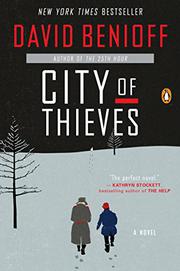This novel by David Benioff (co-creator of HBO's Game of Thrones series) commences with a conversation between author and grandfather as Benioff beseeches his grandfather for recollections of living through the Nazi siege of Leningrad. There seems to be some debate about whether his grandfather was actually there (see review from NYT). Following that prologue, however, we jump into the life of 17 year-old Lev Beniov, who is yet too young to join the army but helps man a fire brigade from the roof of his old apartment building. One night, he and his pals see a parachute coming down and when it lands in the street, they find a dead German pilot, whose corpse they promptly strip for weapons and clothes. Keep in mind that, at this point, they are lucky to get one piece of paper-filled bread or an eighth of an onion to eat on any given day. But when the cops show up, Lev nobly helps a fallen friend, a girl he secretly longs for, to escape and is caught in the process. Awaiting execution overnight, he is joined in his cell by his exact opposite. Whereas Lev is dark and slight and inexperienced with women, Kolya is a descendant of Cossacks with blonde-haired, blue-eyed good looks and charm that women of all ages find irresistible. Kolya swears he did not desert his unit but just missed his ride; nevertheless, they will both be hanged or shot. But fate intervenes and they are taken before a secret police general who wants them to find a dozen eggs for his daughter's upcoming wedding cake. If they succeed--against all odds--they get their lives back. They start by following every rumor and searching all the black market sources in the city and nearly get killed by cannibals. Eventually they go behind enemy lines into the countryside seeking chickens. What they find instead are girls held hostage for pleasuring Nazi officers and a band of partisan fighters. They are captured, but then Kolya hatches a plan to get the eggs from their captors by wagering Lev's chess playing skills against those of the
Sturmbannführer. Benioff provides well-researched and compelling descriptions of the hardships and violence faced by the Russian common folk during the siege. An additional review from Kirkus.

No comments:
Post a Comment